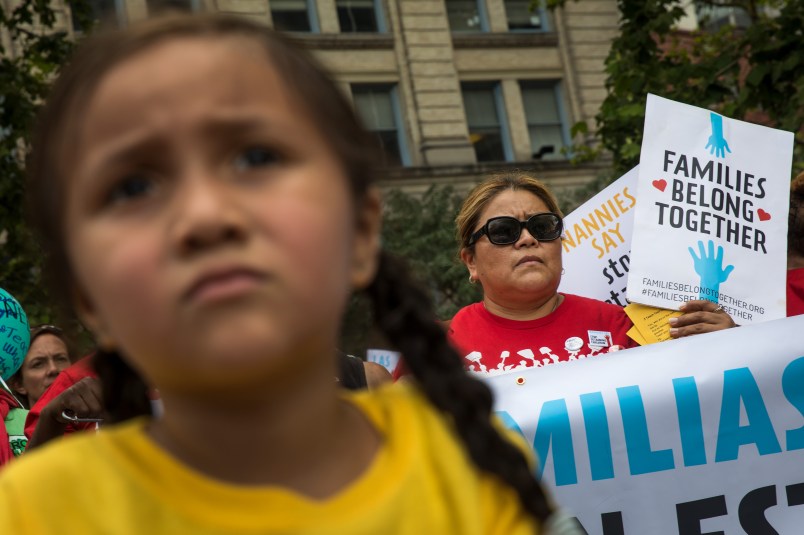As of last week, 565 migrant children who were separated from their parents by the Trump administration’s “zero tolerance” policy remained separated and in U.S. custody. Late Thursday, the Trump administration told a federal court in San Diego that that number has barely budged, dropping to 528 nearly a month after the court’s deadline to reunite all of the separated children. Of the still-separated group, 23 are younger than 5 years old.
Of the children who remain separated, the Trump administration says 343 have a parent who was deported without them. The American Civil Liberties Union, which is representing the parents in the federal class action lawsuit, has taken the lead on trying to find and contact those parents, its attorneys hope many of those cases can be swiftly resolved.
“We had to negotiate with the government about all the logistics of reunifications abroad,” Lee Gelernt, the ACLU’s lead attorney in the case, told TPM. “But that’s all settled now, and the reunifications should pick up fairly quickly for parents who want to have their child returned to them.”
Prospects are less certain, however, for the parents the ACLU has been unable to find. The ACLU says the Trump administration has provided no phone number for 41 of the deported parents, and the number provided for 38 others was inoperable. And even getting that information — many days after the reunification deadline — was a struggle. The Trump administration tried to argue in court that the burden should be on ACLU and other human rights groups to find all of the deported parents and ascertain their wishes for reunification. U.S. District Judge Dana Sabraw, a Republican appointee, shot back in an Aug. 3 hearing that such a stance was “unacceptable.”
“All of this is the result of the government’s separation and then inability and failure to track and reunite,” Judge Sabraw said. “And the reality is that for every parent who is not located there will be a permanently orphaned child. And that is 100 percent the responsibility of the administration.”
A few days later, the ACLU says, the Trump administration began providing the contact information.
“I think the judge reading them the riot act certainly helped,” Gelernt told TPM.
The two sides are also continuing to argue over the fate of parents who believe they were unlawfully deported or pressured into signing deportation papers, and who wish to be returned to the U.S. to pursue an asylum claim.
The Trump administration claims that 139 separated parents have said they do not want to be reunified with their child, though the ACLU has submitted extensive sworn testimony to the court indicating that many of those parents were coerced or misled by ICE officials when they made that decision.
“Several parents have said, ‘I would like to come back to the U.S. and join my child and seek asylum if that is an option, because I was told the only way to see my child was to accept removal and give up my asylum rights.’ But we’re waiting to see whether the court will allow that,” Gelernt explained to TPM. “We’ve explained to them that exploring that option would be a much longer process than reunification in their home country.”
The Trump administration has also labeled dozens of the still-separated parents either temporarily or permanently ineligible for reunification because they found something in a background check or case file review that they consider a “red flag,” including nine parents of children younger than 5 years old.
“They’ve excluded between 40 and 50 parents based on a claim of a criminal history or danger to the child,” Gelernt told TPM. “But based on the information we’ve gotten from the government so far, it doesn’t feel to us that any of the people should have their children taken away. Some of the crimes listed are very minor, like possession of marijuana. Some are not even convictions. Some are charges. Some are just allegations. But even if they are all true, they do not meet the well-tested standards under state laws for what is sufficiently serious to take a child away.”
Though the Trump administration has not yet made public the alleged “red flags” for the parents of children between 5 and 17 years old, their list for children younger than 5 included several outstanding warrants rather than convictions, vague citations of a parent being “wanted” in his home country, and crimes like robbery and driving under the influence that would not normally justify separating a child and parent.
The ACLU and the Trump administration returned to Judge Sabraw’s court Friday afternoon, where, despite the hundreds of families that remained separated, the judge praised both parties for their “good efforts.”
“The report is very encouraging,” he said. “It appears there has been a lot of progress made in the last week.”
Read the latest status report here:










